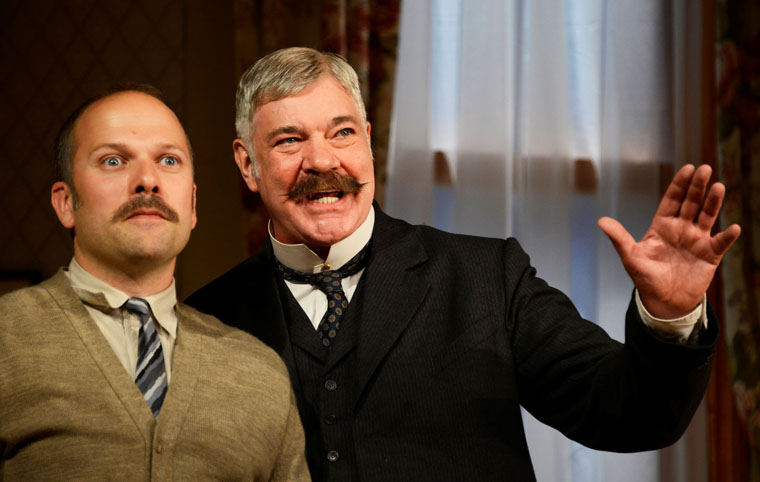What is most interesting about a famous writer? His books, or his life? Which would you rather read, the novels or the gossip? In this wildly surreal comedy Alan Bennett examines the paradoxes of being a ‘known’ author. The opening scene takes place sometime around 1919. Against a bleak, angular staging full of distorted perspectives Franz Kafka, suffering from tuberculosis and a crushing sense of failure, instructs his close friend Max Brod to destroy all his unpublished work. The humour is dark: ‘You look really depressed,’ observes Brod. ‘Wouldn’t you be depressed? I’m dying,’ Kafka replies. In his own day Brod was a successful writer; now he is best known as the man who ignored Kafka’s dying wish by publishing all his work and writing his biography, giving us the ‘Kafka’ we know today. Daniel Weyman as Kafka convincingly portrays that writer’s neurotic self-absorption, while Elliot Levey gives an energetic performance as the more pragmatic, worldly Brod.
We are suddenly transported from Kafka’s angst-ridden past in Czechoslovakia to the cosy normality of a suburban living room in Yorkshire, circa 1986. The man of the house is Sydney who, like Kafka, works in insurance and who rather pompously sees himself as a man of ideas. Obsessed with the minutiae of Kafka’s life he is writing an article about him for his professional journal. Nicholas Burns plays him as an obsessive gatherer of facts, a man wrongly convinced of his superior intelligence who does not allow his undervalued wife Linda to share in his intellectual enthusiasms. The third member of the family and the most broadly comic character in the play is Sydney’s aged father, played with great gusto by Barry McCarthy. Clutching his Zimmer frame in increasing exasperation he is anxiously preparing for the arrival of social service workers who will test him to see whether or not he should be put into care. A visitor does arrive, but he is not a social worker. It is Max Brod, clutching the family’s tortoise on which he has urinated, having been caught short in their garden. The tortoise transmogrifies into Kafka himself and we are off on a fantastical and often uproarious exploration of, amongst other things, fame.
Sydney is delighted by this opportunity to test out his theories about Kafka, while Linda is delighted to have some men in the house who actually show some interest in her. Brod is panic-struck to discover that he is in a house where the shelves are crammed with the works that he supposedly destroyed, and books fly in all directions as he and Sydney attempt to hide them from their author. Samantha Spiro is excellent as the neglected Linda, responding coquettishly to the flattering attention she receives from her unexpected visitors. Surrounded by clashing male egos, Linda is the play’s most sympathetic character; Kafka loudly yearns for anonymity, but Linda ruefully reflects that she has had anonymity thrust upon her simply because she is a woman.
There is further disruption with the arrival of Hermann, Kafka’s domineering father, full of resentment at having been cast as the villain in all the biographies of his famously neurotic offspring and threatening to reveal the dark secret that will explain all his troubles. Matthew Kelly is splendidly physical in this role, bullying his delicate and hypersensitive son into accepting his bear-like embraces. Amid the far-fetched chaos that ensues Bennett offers some thought-provoking insights on a wide range of topics, particularly our current obsession with biographies that salaciously speculate on the private lives of authors. There are moments of melancholy, too; I particularly liked the observation that we spend our youth trying to pass tests that will get us into institutions, and then we spend our old age trying to pass tests that will keep us out of them. But generally this is Bennett at his frothiest, and it is the comic moments that are most memorable. There is some unevenness in the humour, and there is a final scene set in the afterlife that seems rather tacked on and where the jokes are a little forced, but the best moments of Kafka’s Dick are very funny indeed. ‘What a silly play,’ said a lady sat behind me. ‘Yes,’ said her companion, ‘but great fun!’ It certainly is. ★★★☆☆ Mike Whitton
Photos by Nobby Clark


